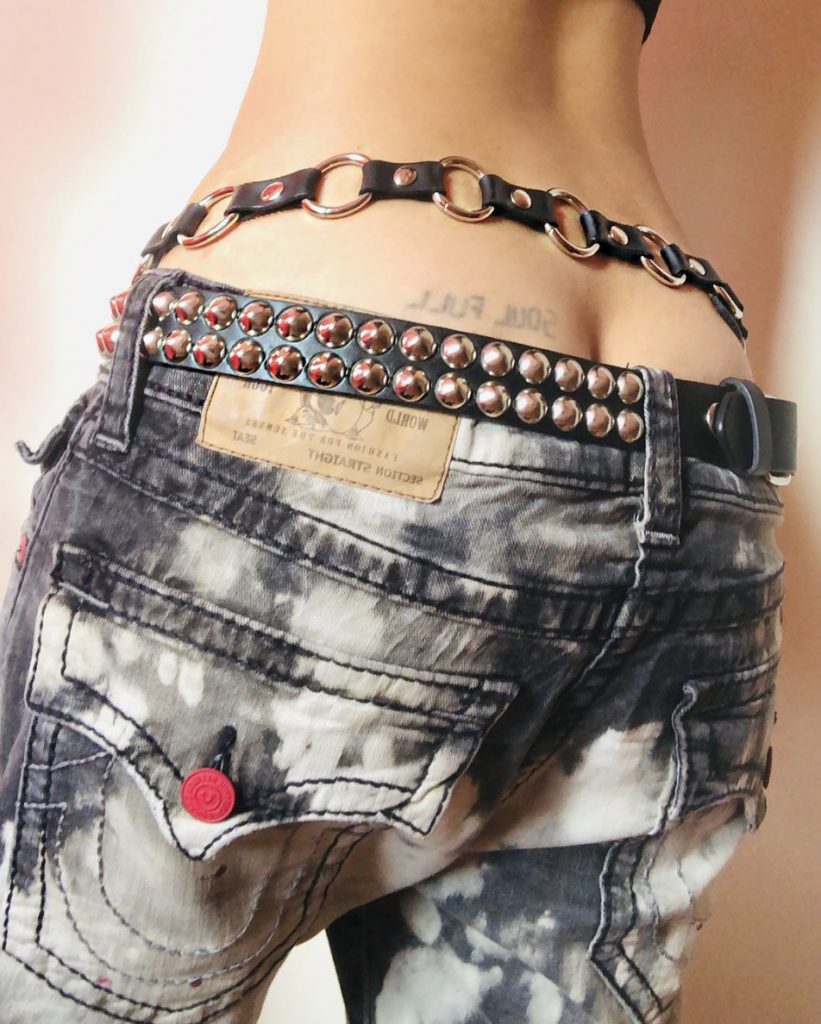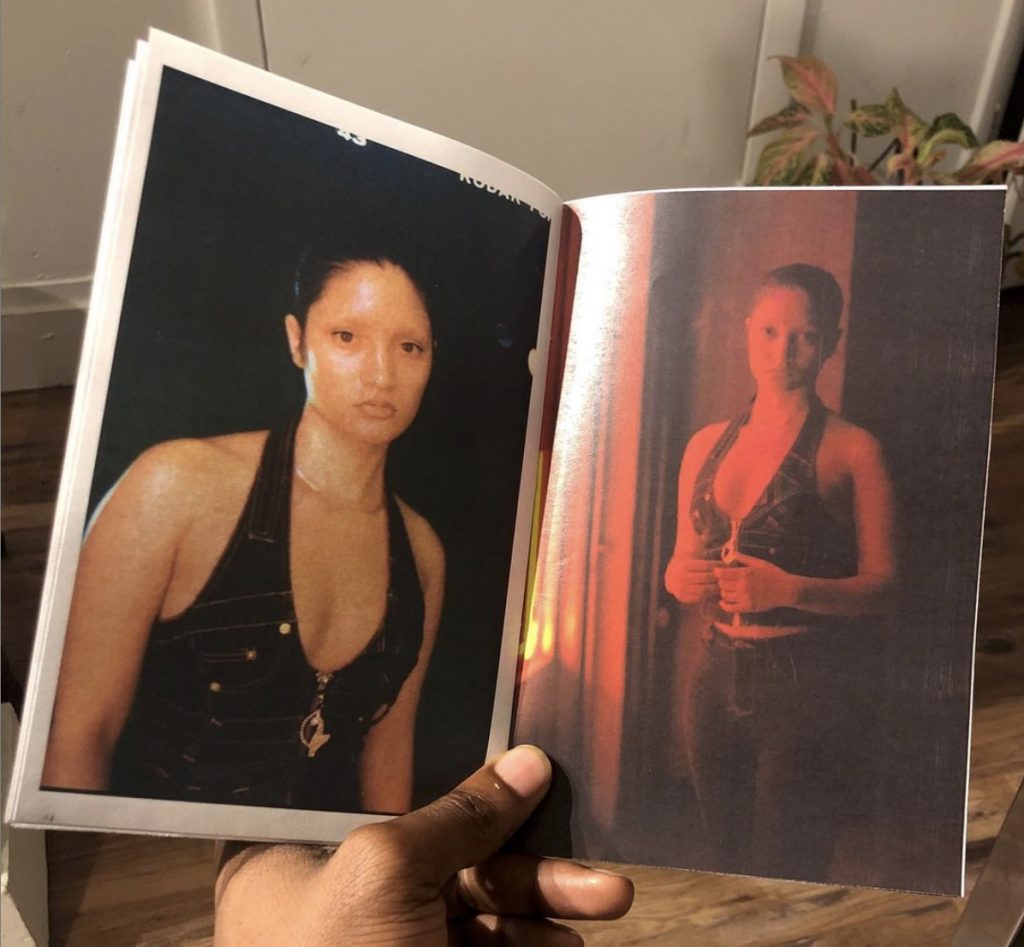Describing Alicia Novella Vasquez with a single word is impossible. Otherwise known as @lightlicker, the New York-based multidisciplinary Instagram persona oscillates between labels. She’s an artist, a writer, a poet, a model, a micro-influencer, birthed in a time where we’re all creative directors of our online identities. Author and curator Fiona Duncan writes in her 2019 autofiction novel Exquisite Mariposa of the visual intricacies of Vasquez’s Instagram posts, where her ability to construct poetic captions and compose images that allude to an intrinsic meaning. She writes, “Alicia intimidated me. Composure does. Those who can pose. Alicia Novella Vasquez, aka @lightlicker, likes to shoot herself from below eye level. This angle imparts power. She told me she’s wary of men who selfie from such a vantage point.”

Vasquez produces art in the form of selfies, digital collages, fashion editorial and short film. Each medium is utilized to collectively speak on desire, attachment, the violence of heartbreak and the purity of love. As Duncan describes Vasquez’s practice, it’s “[t]hat feeling of wanting to destroy the one you love. To consume them. Knowing you’re acting evil and watching yourself do it anyway because you don’t believe in the goodness of yourself.”
In one selfie,Vasquez stands in front of a mirror wearing a beige fur coat, her dark mane of hair cascading down her chest, razor-sharp nails gripping her iPhone. The caption reads, “the devastation; in two acts of abandonment. The mirror and itself”. Vasquez’s Instagram grid is a suite composed of similar selfies, modelling portraits, gritty street photographs and found images. The poetic assembling of the captions often allude to the theme of violence within love, heartbreak and healing.“He was my sister, my lover, my daughter, my negligent father; my prophet,” announces one caption. “I’m all the chaos in harmony; violent sensuality,” says another.
In a poem published on AQNB in 2018, titled ‘A Thousand Angels’, Vasquez demonstrates her casual approach to language. Her use of slang, idioms and repetition in lines like, “Lemme have this security. Lemme cling to this security,” projects a tone of accessibility, while her work often circulates outside of conventional media networks. Her performance of the poem at one of Duncan’s own Hard to Read events in New York emphasises her crucial estrangement from the literary world as part of her appeal as an artist. The monthly lit series is composed of writing presented by people who don’t necessarily identify as writers, which reinforces Vasquez’s status as a non-writer. Saturated with a natural curiosity, her vernacular style can only occur outside of institutional standards.

Communicating via email, Vasquez discusses her writing processes, identity and Instagram, and the intricate relationship between violence, love and healing.
**Describe where you are right now?
Alicia Novella Vasquez: My very red room. It just stopped raining and my headache has calmed. 3:33:33 long YouTube video, 1111hz Spiritual hug of an angel playing in background. I’ve been alone for three days after a kid was killed by a stray bullet on my block. I have yet to leave my place in hopes that it will refocus my energy.
**Can you recall a recent night out?
ANV: I had my first dinner with a friend I had been meaning to see for months. We spoke strictly about pattern recognition, TikTok and concocted plans on how to organize groups to abolish sex trafficking. We both want guns, and we’re both ready to shoot, and we both want to abolish fear. As I’m typing this I am sad. I want nothing more than to fuck the devil in the eye and laugh at the fear they use to manipulate us yet I often doubt if my rage is godly or righteous. But something in me screams yes.
** What was the last book you read?
ANV: [Polish ballet dancer] Vaslav Nijinsky’s diary.
**Your writing style is extremely accessible and the composition feels in-touch with a post-internet age. Is there a process to your writing?
ANV: Stream of consciousness.

**How do you use Instagram to facilitate art practices?
ANV: It’s my most intuitive medium. [I grew] up with little resources so I naturally started painting pictures on Tumblr, then moved to Instagram and started doing the same. In an attempt to respect myself more, I have tried to stop but everyone says I’m still doing it.
**How has your Instagram changed since your first post?
ANV: Social media I feel is always a process of discovering yourself… or ‘yourself’. Regardless, if it’s a botched version of you or not, it’s still an ongoing performance. My first post on my first account was a picture of Katie Got Bandz holding a Starbucks. At the time, she was one of the baddest bitches out and I wanted to celebrate her.
**I noticed some lines in your poem ‘A Thousand Angels’ are similar to your captions. Does one influence the other, does poetry influence your Instagram, or vice versa?
ANV: Poetry influences my everything. Everything is also everything.
**How do you deal with heartbreak?
ANV: I cry, and I cry, and I cry, and I cry, and I cry, and I cry. Then make $5k.
** Where does the love go when a relationship ends?
ANV: It often stays for a very long time. It can show itself best in respect. Respecting someone’s space. Respecting someone’s hurt. Respecting someone’s privacy. Respecting the sacredness of the bond. No one likes to talk about that though. We’re very much addicted to chaos. It was cute but now it’s boring.
**’A Thousand Angels’ is saturated with meaning, can you speak further on the relationship between violence and healing?
ANV: No healing can take place without walking through the fire. In order to heal, you must be courageous. You cannot be courageous without first being afraid. Fear, I believe, often segues into violence.

**Do you see falling in love as a process containing acts of self-violence?
ANV: Short answer, no. Long answer, yes.
Re: short answer; to harm is to not love.
Re: long answer; The term violence is far more deep in color than I believe we’ve been taught to understand. When falling in love after heartbreak. there is a moment where you decide to rip yourself away from your past and put faith in a new beginning. To me, that may sometimes require an act of violence within self. The uprooting of outdated modes of protection. I’m not interested in maintaining the same relationships I’ve always had with certain words. I believe their common usage is very limiting and often pushes us to cower, and I’m only interested in expansion.
How does violence become trauma? An important question.
Is trauma the only way to access real love? No.**
Alicia Novella Vasquez (aka @lightlicker) is a New York-based artist.













